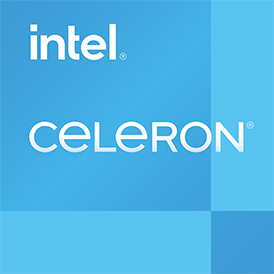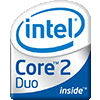
Intel Celeron 2955U Benchmark, Test and specs
Last updated:
The Intel Celeron 2955U has 2 cores with 2 threads and is based on the 4. gen of the Intel Celeron series. The processor uses a mainboard with the BGA 1168 socket and was released in Q3/2013. The Intel Celeron 2955U scores 317 points in the Geekbench 5 single-core benchmark. In the Geekbench 5 multi-core benchmark, the result is 632 points.

| Name: | Intel Celeron 2955U |
|---|---|
| Family: | Intel Celeron (165) |
| CPU group: | Intel Celeron 2000 (7) |
| Architecture: | Haswell U |
| Segment: | Mobile |
| Generation: | 4 |
| Predecessor: | -- |
| Successor: | -- |
CPU Cores and Base Frequency
The Intel Celeron 2955U has 2 CPU cores and can calculate 2 threads in parallel. The clock frequency of the Intel Celeron 2955U is 1.40 GHz. The number of CPU cores greatly affects the speed of the processor and is an important performance indicator.
| CPU Cores / Threads: | 2 / 2 |
|---|---|
| Core architecture: | normal |
| Cores: | 2x |
| Hyperthreading / SMT: | No |
|---|---|
| Overclocking: | No |
| Frequency: | 1.40 GHz |
| Turbo Frequency (1 Core): | -- |
| Turbo Frequency (2 Cores): | -- |
Internal Graphics
The Intel Celeron 2955U has integrated graphics, called iGPU for short. Specifically, the Intel Celeron 2955U uses the Intel HD Graphics (Haswell GT1), which has 80 texture shaders and 10 execution units. The iGPU uses the system's main memory as graphics memory and sits on the processor's die.
| GPU name: | Intel HD Graphics (Haswell GT1) |
|---|---|
| GPU frequency: | 0.20 GHz |
| GPU (Turbo): | 1.00 GHz |
| Compute units: | 10 |
| Shader: | 80 |
| Hardware Raytracing: | No |
| Release date: | Q4/2012 |
| Max. displays: | 3 |
|---|---|
| Generation: | 7.5 |
| Direct X: | 11.1 |
| Technology: | 22 nm |
| Max. GPU Memory: | 2 GB |
| Frame Generation: | No |
Hardware codec support
A photo or video codec that is accelerated in hardware can greatly accelerate the working speed of a processor and extend the battery life of notebooks or smartphones when playing videos.
| h265 / HEVC (8 bit): | No |
|---|---|
| h265 / HEVC (10 bit): | No |
| h264: | Decode / Encode |
| VP8: | No |
| VP9: | No |
| AV1: | No |
|---|---|
| AVC: | Decode / Encode |
| VC-1: | Decode |
| JPEG: | Decode |
Memory & PCIeThe processor can use up to 16 GB memory in 2 (Dual Channel) memory channels. The maximum memory bandwidth is 25.6 GB/s. The memory type as well as the amount of memory can greatly affect the speed of the system. |
|
| Memory type: | Memory bandwidth: |
|---|---|
| LPDDR3-1600 DDR3L-1600 | 12.8 GB/s 25.6 GB/s |
| Max. Memory: | 16 GB |
| Memory channels: | 2 (Dual Channel) |
| ECC: | No |
| PCIe: | 2.0 x 10 |
| PCIe Bandwidth: | 5.0 GB/s |
Thermal ManagementThe thermal design power (TDP for short) of the processor is 15 W. The TDP specifies the necessary cooling solution that is required to cool the processor sufficiently. The TDP usually gives a rough idea of the actual power consumption of the CPU. |
|
|---|---|
| TDP (PL1 / PBP): | 15 W |
| TDP (PL2): | -- |
| TDP up: | -- |
| TDP down: | -- |
| Tjunction max.: | 100 °C |
Technical details
The Intel Celeron 2955U is made in 22 nm. The smaller the manufacturing process of a CPU, the more modern and energy-efficient it is. Overall, the processor has 2.00 MB cache. A large cache can greatly speed up the processor's speed in some cases such as games.
| Technology: | 22 nm |
|---|---|
| Chip design: | Monolithic |
| Socket: | BGA 1168 |
| L2-Cache: | -- |
| L3-Cache: | 2.00 MB |
| AES-NI: | Yes |
| Operating systems: | Windows 10, Linux |
| Virtualization: | VT-x, VT-x EPT, VT-d |
|---|---|
| Instruction set (ISA): | x86-64 (64 bit) |
| ISA extensions: | SSE4.1, SSE4.2 |
| Release date: | Q3/2013 |
| Release price: | -- |
| Part Number: | -- |
| Documents: | Technical data sheet |
Rate this processor
Benchmark results

The benchmark results for the Intel Celeron 2955U have been carefully checked by us. We only publish benchmark results that have been created by us or that have been submitted by a visitor and then checked by a team member. All results are based on and fullfill our benchmark guidelines.
Geekbench 5, 64bit (Single-Core)
Geekbench 5 is a cross plattform benchmark that heavily uses the systems memory. A fast memory will push the result a lot. The single-core test only uses one CPU core, the amount of cores or hyperthreading ability doesn't count.

|
Intel Celeron 3205U
2C 2T @ 1.50 GHz |
||

|
Samsung Exynos 9609
8C 8T @ 2.20 GHz |
||

|
AMD Athlon II X4 610e
4C 4T @ 2.40 GHz |
||
|
|
Intel Celeron 2955U
2C 2T @ 1.40 GHz |
||

|
Intel Core2 Duo E4500
2C 2T @ 2.20 GHz |
||

|
Intel Celeron 1017U
2C 2T @ 1.60 GHz |
||

|
Intel Celeron 2957U
2C 2T @ 1.40 GHz |
||
Geekbench 5, 64bit (Multi-Core)
Geekbench 5 is a cross plattform benchmark that heavily uses the systems memory. A fast memory will push the result a lot. The multi-core test involves all CPU cores and taks a big advantage of hyperthreading.

|
AMD A6-5357M
2C 2T @ 3.50 GHz |
||

|
Intel Atom x5-Z8330
4C 4T @ 1.44 GHz |
||

|
Intel Atom Z3740D
4C 4T @ 1.33 GHz |
||
|
|
Intel Celeron 2955U
2C 2T @ 1.40 GHz |
||

|
Intel Celeron 2957U
2C 2T @ 1.40 GHz |
||

|
Intel Core2 Duo E4700
2C 2T @ 2.60 GHz |
||

|
Intel Atom Z3745D
4C 4T @ 1.33 GHz |
||
Geekbench 6 (Single-Core)
Geekbench 6 is a benchmark for modern computers, notebooks and smartphones. What is new is an optimized utilization of newer CPU architectures, e.g. based on the big.LITTLE concept and combining CPU cores of different sizes. The single-core benchmark only evaluates the performance of the fastest CPU core, the number of CPU cores in a processor is irrelevant here.

|
Samsung Exynos 7904
8C 8T @ 1.80 GHz |
||

|
Intel Celeron 3205U
2C 2T @ 1.50 GHz |
||

|
Qualcomm Snapdragon 632
8C 8T @ 1.80 GHz |
||
|
|
Intel Celeron 2955U
2C 2T @ 1.40 GHz |
||

|
Intel Atom x6416RE
4C 4T @ 1.70 GHz |
||

|
Intel Celeron 1017U
2C 2T @ 1.60 GHz |
||

|
Intel Celeron 2957U
2C 2T @ 1.40 GHz |
||
Geekbench 6 (Multi-Core)
Geekbench 6 is a benchmark for modern computers, notebooks and smartphones. What is new is an optimized utilization of newer CPU architectures, e.g. based on the big.LITTLE concept and combining CPU cores of different sizes. The multi-core benchmark evaluates the performance of all of the processor's CPU cores. Virtual thread improvements such as AMD SMT or Intel's Hyper-Threading have a positive impact on the benchmark result.

|
Intel Celeron N3150
4C 4T @ 2.08 GHz |
||

|
MediaTek MT6750
8C 8T @ 1.50 GHz |
||

|
MediaTek MT8168
4C 4T @ 2.00 GHz |
||
|
|
Intel Celeron 2955U
2C 2T @ 1.40 GHz |
||

|
Intel Celeron 2957U
2C 2T @ 1.40 GHz |
||

|
Intel Celeron N3160
4C 4T @ 2.24 GHz |
||

|
MediaTek MT8766B
8C 8T @ 2.00 GHz |
||
iGPU - FP32 Performance (Single-precision GFLOPS)
The theoretical computing performance of the internal graphics unit of the processor with simple accuracy (32 bit) in GFLOPS. GFLOPS indicates how many billion floating point operations the iGPU can perform per second.

|
Intel Core i7-2610UE
Intel HD Graphics 3000 @ 0.85 GHz |
||

|
Intel Pentium 3825U
Intel HD Graphics (Broadwell GT1) @ 0.85 GHz |
||

|
AMD A4-4355M
AMD Radeon HD 7400G @ 0.42 GHz |
||
|
|
Intel Celeron 2955U
Intel HD Graphics (Haswell GT1) @ 1.00 GHz |
||

|
Intel Pentium 3556U
Intel HD Graphics (Haswell GT1) @ 1.00 GHz |
||

|
Intel Pentium 3558U
Intel HD Graphics (Haswell GT1) @ 1.00 GHz |
||

|
Intel Celeron 2981U
Intel HD Graphics (Haswell GT1) @ 1.00 GHz |
||
Estimated results for PassMark CPU Mark
Some of the CPUs listed below have been benchmarked by CPU-monkey. However the majority of CPUs have not been tested and the results have been estimated by a CPU-monkey’s secret proprietary formula. As such they do not accurately reflect the actual Passmark CPU mark values and are not endorsed by PassMark Software Pty Ltd.

|
Intel Pentium N3510
4C 4T @ 2.40 GHz |
||

|
Samsung Exynos 7580
8C 8T @ 1.60 GHz |
||

|
Intel Core2 Duo E4700
2C 2T @ 2.60 GHz |
||
|
|
Intel Celeron 2955U
2C 2T @ 1.40 GHz |
||

|
Intel Pentium E5200
2C 2T @ 2.50 GHz |
||

|
Intel Celeron 2957U
2C 2T @ 1.40 GHz |
||

|
Intel Pentium B940
2C 2T @ 2.00 GHz |
||
Cinebench R15 (Single-Core)
Cinebench R15 is the successor of Cinebench 11.5 and is also based on the Cinema 4 Suite. Cinema 4 is a worldwide used software to create 3D forms. The single-core test only uses one CPU core, the amount of cores or hyperthreading ability doesn't count.

|
Intel Core i3-4010U
2C 4T @ 1.70 GHz |
||

|
AMD A10-7700K
4C 4T @ 3.80 GHz |
||

|
Intel Xeon E3-1220L v3
4C 8T @ 1.50 GHz |
||
|
|
Intel Celeron 2955U
2C 2T @ 1.40 GHz |
||

|
AMD A10-5700
4C 4T @ 4.00 GHz |
||

|
AMD Athlon II X4 605e
4C 4T @ 2.30 GHz |
||

|
Intel Celeron 2957U
2C 2T @ 1.40 GHz |
||
Cinebench R15 (Multi-Core)
Cinebench R15 is the successor of Cinebench 11.5 and is also based on the Cinema 4 Suite. Cinema 4 is a worldwide used software to create 3D forms. The multi-core test involves all CPU cores and taks a big advantage of hyperthreading.

|
Intel Celeron N2930
4C 4T @ 2.16 GHz |
||

|
AMD A6-9220
2C 2T @ 2.70 GHz |
||

|
Intel Atom x5-Z8300
4C 4T @ 1.84 GHz |
||
|
|
Intel Celeron 2955U
2C 2T @ 1.40 GHz |
||

|
Intel Celeron 2957U
2C 2T @ 1.40 GHz |
||

|
AMD A6-1450
4C 4T @ 1.40 GHz |
||

|
Intel Celeron 1007U
2C 2T @ 1.50 GHz |
||
Benchmarks

Geekbench 5 (SC)
2,479 entries
2,479 entries

Geekbench 5 (MC)
2,452 entries
2,452 entries

Geekbench 6 (SC)
1,745 entries
1,745 entries

Geekbench 6 (MC)
1,693 entries
1,693 entries

FP32 SP (iGPU)
2,010 entries
2,010 entries

PassMark CPU-Mark
2,386 entries
2,386 entries

Cinebench R15 (SC)
1,106 entries
1,106 entries

Cinebench R15 (MC)
1,101 entries
1,101 entries

Geekbench 3 (SC)
942 entries
942 entries

Geekbench 3 (MC)
938 entries
938 entries

Cinebench R11.5 (SC)
825 entries
825 entries

Cinebench R11.5 (MC)
836 entries
836 entries

Cinebench R11.5 iGPU
383 entries
383 entries
Popular comparisons
back to index




